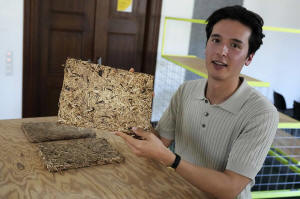Harvesting hops for beer produces a lot of waste. These German groups
are seeking to fix that
 Send a link to a friend
Send a link to a friend
 [October 01, 2024] By
STEFANIE DAZIO [October 01, 2024] By
STEFANIE DAZIO
MUNICH (AP) — Two students in Munich, sipping beers on their dormitory
couch in 2022, chatted about a recent lecture describing the use of
banana fibers in Colombia to make sustainable building materials.
Wouldn't it be great, the Technical University of Munich students joked,
to do something similar with a local product here in Bavaria — perhaps
with the waste from the region's famous hops?
The next day, they began researching. Within months, they'd launched a
startup called HopfON — a play on Hopfen, the German word for hops —
that's now scaling up from its lab models and pilot project to
real-world products.
While HopfON's goal is to reduce waste created by the construction and
beer industries by making products that use the leaves, spines and vines
left over from the hops harvest, the Society of Hop Research in the
heart of Bavaria is breeding new varieties that reduce the plant's
excess from the beginning.
The figures surrounding waste are staggering. More than one-third of all
waste generated in the European Union comes from the construction and
demolition industry, according to an EU report published in January.

And when hops are harvested each fall in Germany's Hallertau region —
the world’s largest hops-growing area that's about an hour north of
Oktoberfest — for every 1 kilogram (2.2 lbs.) of material inside the
cones that can be used to brew beer, there are 3.5 kilograms (7.7 lbs.)
of wasted biomass from the rest of the plant. That's a ratio that's
roughly 20% usable product to 80% waste.
Some of the hops waste can be used for fertilizers, and a portion can be
sold to biogas plants to produce energy. But the majority is unusable
for farmers, who may be forced to rent additional farmland to dump piles
of the waste away from their crops. The piles can ferment and emit
greenhouse gases — and sometimes catch fire.
“We saw a huge potential in sourcing locally and also using a waste
stream that was neglected by basically most people," HopfON entrepreneur
Mauricio Fleischer Acuña told The Associated Press.

[to top of second column] |

HopfON entrepreneur, Mauricio Fleischer Acuna poses in Munich,
Germany, Friday, Sept. 20, 2024. The startup is using the organic
waste, some from the hops harvest, to make sustainable building
materials like acoustic panels and thermal insulation, with the
twofold goal of reducing waste from the construction industry. (AP
Photo/Matthias Schrader)
 HopfON seeks to reduce the
construction industry's waste, and its planet-warming emissions, by
limiting the need for finite resources through hops-made products.
The startup has also launched a circular model where customers can
return their products to be remade into new materials.
During the fall harvest, the team takes the fresh material from
farms and dries it immediately, Fleischer Acuña said, then removes
any impurities and recyclable metals. It's chopped up and separated
out for a patent-pending process that uses binding agents already in
the plant to turn the biomass into products like acoustic panels,
thermal insulation and building boards.
A coworking space in the southwestern German city of Mannheim was
the startup's first customer for the acoustic panels. A future plan
is to make drywall alternatives.
Fleischer Acuña and his partners — Marlene Stechl and Thomas Rojas
Sonderegger, the two students in the university dorm — also plan to
widen their business to use other organic materials and will
eventually change their name from HopfON to onmatter.
The trio is not the only group in Bavaria seeking to solve this
problem. At the Society of Hop Research in Hüll, researchers have
developed new varieties of hops that are more sustainable and
produce less waste. Managing Director Walter König says the new
varieties mean that for every 1 kilogram (2.2 lbs.) of cones, there
are just 1.2 to 1.4 kilograms (2.6 to 3.1 lbs.) of waste.
Perhaps most importantly, König said the research did not sacrifice
the hops' quality — meaning they ultimately retained the traditional
taste that brewers, and beer lovers, want.
“It’s a very sophisticated thing to bring them all together for a
new variety that smells good and that fits to the beers that we
need,” he added.
__
Pietro De Cristofaro contributed to this report.
All contents © copyright 2024 Associated Press. All rights reserved |